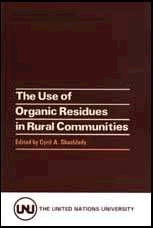
Preface[edit | edit source]
A Workshop on Organic Residues in Rural Communities was convened in Denpasar, Bali, Indonesia, 11-12 December 1979, under the auspices of the Indonesian Government Institute of Sciences (LIPI), the Government of the Netherlands, and the United Nations University. Its purpose was to discuss ways and means in which unused organic residues in rural areas of developing countries could be best utilized and turned to human benefit. The workshop generated recommendations for concrete research and development projects to be undertaken in Indonesia.
In total, 52 participants attended the workshop: 24 from Indonesia and 28 from abroad. The foreign participants came from Australia (2), Fiji (1), France (1), India (2), Japan (2), Malaysia (1), the Netherlands (7), the Philippines (3), Sri Lanka (1), Sweden (1), Tanzania (1), Thailand (1), the United States (1), Unesco (1), and the United Nations University (3). Of the Indonesian participants, 10 represented universities and 14 government research institutions.
The meeting was organized in the form of plenary and working group sessions. A general description of bioconversion activities within the programme of the United Nations University was given, followed by the presentation of a number of papers on various aspects of bioconversion. A general discussion was held at the end of each session of the plenary. There were 17 scientific papers presented in these four plenary sessions, covering the importance of residues for various purposes, the agicultural residues available, and the current ways of using them. Summaries of the panel discussions are printed here along with the papers for each session.
After the presentation of all papers, the working group meeting discussed and formulated possible research and development project proposals. Originally, it was planned to have three working groups, to discuss fibrous wastes, carbohydrate residues, and other residues. Because of the obvious interest among the participants, a fourth group on biogas was also formed. These working groups discussed proposals for research and development projects that could be funded by sponsoring bodies. The recommendations of the three initial working groups are summarized and a fuller report of the group on biogas is given at the end of this book. A small team then formulated follow-up actions and research and development proposals for bilateral co-operation between Indonesia and the Netherlands.
We are grateful to the United Nations University, the Government of the Netherlands, the Office of the State Minister for Research and Technology, the Ministry of Agriculture, the Ministry of Education and Culture, the provincial government of Bali, and all others who have contributed to the workshop, for all of their efforts and support to make this gathering possible.
The Indonesian Institute of Sciences